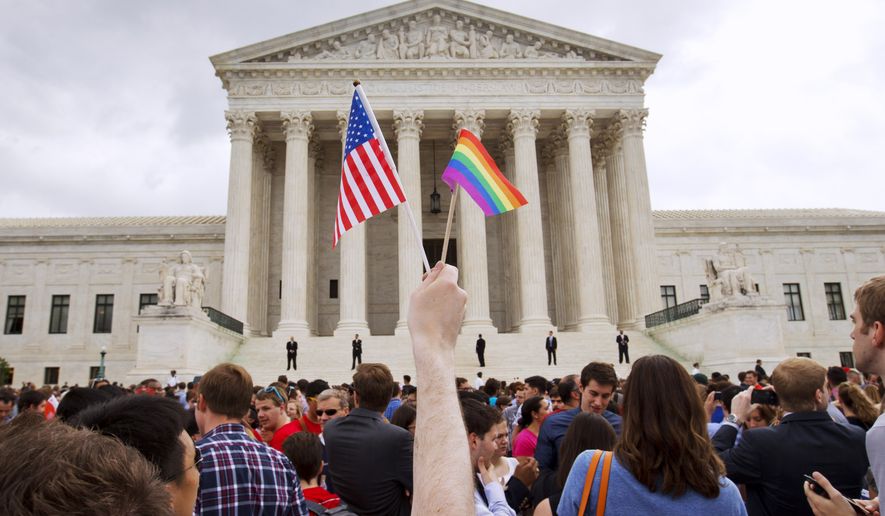In the nearly two weeks since the Supreme Court ruled the Constitution guarantees a right to same-sex marriage, the gay community hasn’t been the only group celebrating: Some Second Amendment advocates are reading the decision as a win for their cause as well.
They have argued that the protections of the 14th Amendment the court cited in the Obergefell v. Hodges decision, striking down state bans on same-sex marriage, could translate to loosened restrictions for concealed carry licenses — potentially forcing states that don’t recognize concealed carry permits issued in other states to do so.
It’s a flawed line of legal reasoning, say attorneys specializing in Second Amendment issues and constitutional law. But the fact the idea is gaining traction among pro-gun groups has prompted the National Rifle Association to weigh in to provide clarification.
“We strongly advise concealed carry license holders not to assume Obergefell provides them with the legal basis they need to carry without an in-state license in strongly anti-gun states such as Maryland, New Jersey, or New York,” the NRA wrote in a statement issued over the weekend.
“This is so for a number of reasons, chief of which is that the U.S. Supreme Court has not yet ruled squarely on the question of whether the Second Amendment protects the right to carry a loaded handgun in public, and if it does, whether states must recognize each other’s permits.”
Among those touting the idea that the same-sex marriage decision could do away with concealed carry restrictions is Bob Owens, editor of BearingArms.com, who wrote on the issue in an article shared widely among gun rights advocates.
“Using the same ’due process clause’ argument as the Supreme Court just applied to gay marriage, my concealed carry permit must now be recognized as valid in all 50 states and the District of Columbia,” he wrote in an article posted June 26, the date the Supreme Court decision was issued. “As of today, with this decision, it would seem that these states and the District must honor my concealed carry permit, or violate my constitutional rights under the 14th and Second Amendment.”
It’s an argument that has flummoxed constitutional law scholar Adam Winkler.
“It’s even hard for me to criticize the argument because it’s so far fetched,” said the UCLA professor, whose specialty is Second Amendment issues. “They are interpreting the Second and not the 14th Amendment. It’s not like the logic or reasoning that the court is using would translate.”
While the Supreme Court has affirmed a right to keep a gun for self-defense in one’s home in the landmark District of Columbia v. Heller case, which in 2008 overturned the District’s near total ban on firearm ownership, it has yet to take up a case on the right to carry.
As the high court has declined to hear a myriad of concealed carry cases, states have developed their own often widely differing laws on carrying firearms.
A handful of states with liberal policies allow residents to carry concealed firearms without obtaining permits. Meanwhile, “shall issue” states require authorities to provide a license to any applicant who meets specified criteria, and more restrictive “may issue” states give authorities discretion to determine whether a gun owner demonstrates a compelling need for a license to carry.
And while some states recognize firearm carry permits issued outside their borders, others do not. Maryland, which requires concealed carry applicants to provide a “good and substantial reason” for a permit, does not recognize permits from any other state.
The question of reciprocity
In the Obergefell case, the Supreme Court was asked to decide whether the 14th Amendment requires a state to license same-sex marriage and recognize such unions made in other states.
Gun rights activists might have had more room to argue the case could lead to a national concealed carry reciprocity agreement if the justices had ruled that states could ban same-sex marriage but were obligated to recognize marriages performed in other states, said David Hardy, a Tucson, Arizona-based attorney who has written extensively on the Second Amendment.
“If a state was forced to recognize a marriage contract outside its boundaries but contrary to its own law, then it might be obliged to recognize concealed carry permits issued outside its boundaries,” Mr. Hardy said.
But as written, the decision has no bearing on anything aside other than same-sex marriage, Mr. Hardy said.
“I can’t see how it advances the cause of gun rights,” he said.
That doesn’t mean those challenging restrictive concealed carry laws won’t try.
Ilya Shapiro, a senior fellow in constitutional studies at the Cato Institute, said attorneys advocating for concealed carry reciprocity might find some success in citing Justice Anthony Kennedy’s majority opinion in future arguments.
“I think judges who would otherwise be inclined to rule in favor of such a challenge would latch onto Kennedy’s opinion,” he said.
Concealed carry laws in the District and two California counties that require an applicant to show a “good reason” for a permit are currently under separate challenges at the federal appellate court level, with Second Amendment activists closely watching both for their potential to make it to the Supreme Court.
Alan Gottlieb of the Second Amendment Foundation, which has backed both lawsuits, said that because neither case is about permit reciprocity, it might be difficult to argue a connection to the Supreme Court decision written by Justice Kennedy.
“I don’t know if there is a way to piggyback this onto the current cases,” he said.
But in any future lawsuits the group handles that tackle reciprocity issues, he expects the Obergefell ruling would be raised.
• Andrea Noble can be reached at anoble@washingtontimes.com.




Please read our comment policy before commenting.